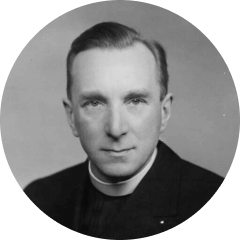Vigo Auguste Demant
(1893–1983)
Vigo Auguste Demant (1893–1983) became, while working at St Silas, Kentish Town, London, Director of Research for the Christian Social Council, 1929–33; as noted in the ODNB, he was ‘the major theoretician in the Christendom Group of Anglican Catholic thinkers, whose concern was to establish the centrality of what they termed “Christian sociology”, an analysis of society fundamentally rooted in a Catholic and incarnational theology’. The Group’s quarterly, Christendom, ran from 1931 to 1950. He was vicar of St John-the-Divine, Richmond, Surrey, 1933–42; Canon Residentiary, 1942–9, and Treasurer, 1949, at St Paul’s Cathedral. He was Canon of Christ Church, Oxford, and Regius Professor of Moral and Pastoral Theology, Oxford, 1949–71. His works include This Unemployment: Disaster or Opportunity? (1931), God, Man and Society (1933), Christian Polity (1936), The Religious Prospect (1939), and Theology of Society (1947).
On 8 Aug. 1940 TSE was to write this unsolicited recommendation to Sir Stephen Gaselee (Foreign Office): ‘My friend the Reverend V. A. Demant, whom I have been associated with intellectually for some years, has been recommended by the Bishop of Bath and Wells for a vacant canonry at Westminster. Demant is, in my opinion, one of the most brilliant, or perhaps the most brilliant, of the younger theologians in England, and I also consider him thoroughly sound both in theology and politics. His book, The Religious Prospect, was one of the very few important books of last year. He is a very conscientious parish priest, with a large straggling parish in Richmond, and if he is to make the most of his gifts and do what he should do for Anglican theology in the future, he ought to be freed from this routine.’
Demant remarked at the Requiem Mass for TSE at St Stephen’s Church, 17 Feb. 1965: ‘The Revd. Frank Hillier, to whom Eliot used to go for confession and spiritual direction after the death of Father Philip Bacon, writes to me: “Eliot had, along with that full grown stature of mind, a truly child-like heart – the result of his sense of dependence on GOD. And along with it he had the sense of responsibility to GOD for the use of his talents. To his refinedness of character is due the fact that like his poetry he himself was not easily understood – but unbelievers always recognized his faith”’ (St Stephen’s Church Magazine, Apr. 1965, 9).
